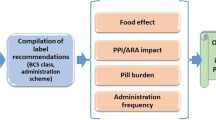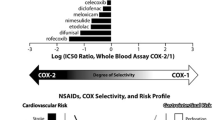Abstract
Background
Patients with cancer often receive chemotherapeutic agents concurrently with other medications to treat comorbidity. The practical effects of concomitant medications, especially polypharmacy, on adverse drug reactions related to irinotecan-based chemotherapy are not well documented.
Methods
Associations of adverse drug reactions related to irinotecan monotherapy or a combination of irinotecan, 5-fluorouracil, and l-leucovorin (FOLFIRI) with concomitant medicines used to treat comorbidity were retrospectively investigated in Japanese patients with cancer.
Results
Of the 172 patients, 118 received concomitant medications. Twenty-one patients had grade 4 neutropenia and/or grade 3 or 4 diarrhea. Univariate and multivariate analyses revealed that concomitant medications were significantly associated with irinotecan-related severe neutropenia and/or diarrhea (P = 0.023 and 0.044). Multiple concomitant medications were significantly related to severe irinotecan-related toxicity in patients given monotherapy or FOLFIRI (P = 0.01). The incidence of severe irinotecan-related toxicities increased in parallel with the number of concomitant medications.
Conclusion
We found that multiple concomitant medicines were significantly associated with severe irinotecan-related toxicity, indicating that polypharmacy must be effectively managed to decrease the risk of adverse drug reactions in patients with cancer who received irinotecan-based chemotherapy.
Similar content being viewed by others
References
Beijnen JH, Schellens JH (2004) Drug interactions in oncology. Lancet Oncol 5:489–496
Blower P, de Wit R, Goodin S et al (2005) Drug–drug interactions in oncology: why are they important and can they be minimized? Crit Rev Oncol Hematol 55:117–142
Chan A, Yap KY, Koh D et al (2011) Electronic database to detect drug–drug interactions between antidepressants and oral anticancer drugs from a cancer center in Singapore: implications to clinicians. Pharmacoepidemiol Drug Saf 20:939–947
Jansman FG, Idzinga FS, Smit WM et al (2005) Classification and occurrence of clinically significant drug interactions with irinotecan and oxaliplatin in patients with metastatic colorectal cancer. Clin Ther 27:327–335
Jansman FG, Reyners AK, van Roon EN et al (2011) Consensus-based evaluation of clinical significance and management of anticancer drug interactions. Clin Ther 33:305–314
Riechelmann RP, Tannock IF, Wang L et al (2007) Potential drug interactions and duplicate prescriptions among cancer patients. J Natl Cancer Inst 99:592–600
Kudoh S, Fujiwara Y, Takada Y et al (1998) Phase II study of irinotecan combined with cisplatin in patients with previously untreated small-cell lung cancer. West Japan Lung Cancer Group. J Clin Oncol 16:1068–1074
Negoro S, Fukuoka M, Masuda N et al (1991) Phase I study of weekly intravenous infusions of CPT-11, a new derivative of camptothecin, in the treatment of advanced non-small-cell lung cancer. J Natl Cancer Inst 83:1164–1168
Rougier P, Van Cutsem E, Bajetta E et al (1998) Randomised trial of irinotecan versus fluorouracil by continuous infusion after fluorouracil failure in patients with metastatic colorectal cancer. Lancet 352:1407–1412
Fujita K, Sasaki Y (2007) Pharmacogenomics in drug-metabolizing enzymes catalyzing anticancer drugs for personalized cancer chemotherapy. Curr Drug Metab 8:554–562
Ando Y, Saka H, Ando M et al (2000) Polymorphisms of UDP-glucuronosyltransferase gene and irinotecan toxicity: a pharmacogenetic analysis. Cancer Res 60:6921–6926
Innocenti F, Undevia SD, Iyer L et al (2004) Genetic variants in the UDP-glucuronosyltransferase 1A1 gene predict the risk of severe neutropenia of irinotecan. J Clin Oncol 22:1382–1388
Araki K, Fujita K, Ando Y et al (2006) Pharmacogenetic impact of polymorphisms in the coding region of the UGT1A1 gene on SN-38 glucuronidation in Japanese patients with cancer. Cancer Sci 97:1255–1259
Han JY, Lim HS, Shin ES et al (2006) Comprehensive analysis of UGT1A polymorphisms predictive for pharmacokinetics and treatment outcome in patients with non-small-cell lung cancer treated with irinotecan and cisplatin. J Clin Oncol 24:2237–2244
Minami H, Sai K, Saeki M et al (2007) Irinotecan pharmacokinetics/pharmacodynamics and UGT1A genetic polymorphisms in Japanese: roles of UGT1A1*6 and *28. Pharmacogenet Genomics 17:497–504
Brunton LL, Lazo JS, Parker KL (2006) Goodman & Gilman’s the pharmacological basis of therapeutics, 11th edn. McGraw-Hill, New York
Corcoran ME (1997) Polypharmacy in the older patient with cancer. Cancer Control 4:419–428
Yancik R (1997) Cancer burden in the aged: an epidemiologic and demographic overview. Cancer 80:1273–1283
Oda M, Kotegawa T, Tsutsumi K et al (2003) The effect of itraconazole on the pharmacokinetics and pharmacodynamics of bromazepam in healthy volunteers. Eur J Clin Pharmacol 59:615–619
Araki K, Yasui-Furukori N, Fukasawa T et al (2004) Inhibition of the metabolism of etizolam by itraconazole in humans: evidence for the involvement of CYP3A4 in etizolam metabolism. Eur J Clin Pharmacol 60:427–430
Sparreboom A, Fujita K, Zamboni WC (2010) Topoisomerase I-targeting drugs. In: Chabner BA, Longo DL (eds) Cancer chemotherapy and biotherapy: principles and practice, 5th edn. Lippincott Williams & Wilkins, Philadelphia, pp 342–355
de Jong FA, van der Bol JM, Mathijssen RH et al (2008) Renal function as a predictor of irinotecan-induced neutropenia. Clin Pharmacol Ther 84:254–262
Acknowledgments
This work was supported in part by a Grant-in-Aid for Cancer Research from the Ministry of Health, Labour and Welfare of Japan (21S-8-1 to Y.S.), in part by a Grant-in-Aid for Scientific Research (C) (23590198 to K.F.) from the Japan Society for the Promotion of Science (JSPS), and in part by a Grant-in-Aid for “Support Project of Strategic Research Center in Private Universities” from the Ministry of Education, Culture, Sports, Science and Technology (MEXT) to Saitama Medical University Research Center for Genomic Medicine.
Conflict of interest
All authors have no conflict of interests.
Author information
Authors and Affiliations
Corresponding author
About this article
Cite this article
Sasaki, T., Fujita, Ki., Sunakawa, Y. et al. Concomitant polypharmacy is associated with irinotecan-related adverse drug reactions in patients with cancer. Int J Clin Oncol 18, 735–742 (2013). https://doi.org/10.1007/s10147-012-0425-5
Received:
Accepted:
Published:
Issue Date:
DOI: https://doi.org/10.1007/s10147-012-0425-5




